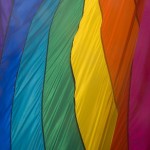This is the second post in a short series I’ve been working on about the problems that privilege brings in Christian pacifist circles. The first post can be found here. I’m also linking this post up to the Political Jesus synchroblog–The New Pacifism.
In my last post on pacifism, I discussed the tendency of many privileged pacifists to shame survivors who do not react to abuse in “approved” non-violent ways. I wrote about how it’s dehumanizing to hear people who admittedly probably won’t face [insert type of abuse or oppression here] pontificating about how they would respond to said abuse or oppression.
Now, I’m going to go on record to say that, although privileged pacifists often need to shut up and listen to folks from marginalized groups and to survivors from abuse, I am not giving all acts of self-defense a stamp of approval.
Why?
I’m going to draw a quote from bell hooks’ All About Love (pgs. 194-195) that I think illustrates this:
An adult white male answers the door when a young Asian male rings the bell. We live in a culture where without responding to any gesture of aggression or hostility on the past of the stranger, who is simply lost and trying to find the correct address, the white male shoots him, believing he is protecting his life and his property…The person who is really the threat here is the home owner who has been so well socialized by the thinking of white supremacy, of capitalism, of patriarchy that he can no longer respond rationally.
White supremacy has taught him that all people of color are threats irrespective of their behavior…This is what the worship of death looks like.
Context matters when we’re talking about acts that look like violence and when we’re talking about acts that present themselves as self-defense. Context matters and power matters.
How many stories similar to the one hooks discusses do we hear on the news? From Trayvon Martin and Jonathan Ferrell to the hate crimes against anyone perceived as Muslim.
Oppressive power structures and privilege warp our minds and cause us to see certain people as dangerous, regardless of what they do. These structures dehumanize and stereotype in order to convince those of us who are privileged to take drastic measures of so-called self-defense.
They dehumanize Muslim women as helpless victims and Muslim men as monsters in order to convince us that our country’s wars are just and that hate-crimes are understandable. They stereotype black men as criminals to the point where our knee-jerk tendency is to sympathize with George Zimmerman rather than with a murdered teenager.
But because many pacifists ignore the existence of these power structures (not all–lots of pacifist movements began in marginalized groups that never had the luxury to ignore oppressive power), they come to conclusions that put as much shame on survivors and victims as they do on abusers and oppressors.
No, Trayvon Martin is not just as in the wrong as George Zimmerman because Trayvon fought for his life. A person who uses force to escape an abusive relationship is not also an abuser because of that.
Privileged pacifists could do better work if they stopped shaming survivors and victims of oppression/abuse and instead started fighting the systems that paint certain people as rapeable, murderable, attackable, abusable.
By challenging other privileged people to be aware of and actively work against systems that do violence to people, privileged pacifists can effectively work for peace. Otherwise, privileged pacifists are only helping these systems silence and dehumanize.











